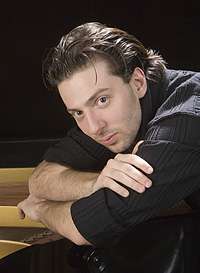|
Back
The Story-Teller New York
Zankel Hall, Carnegie Hall
03/19/2012 -
Jean-Baptiste-Antoine Forqueray: La Rameau
Jean-Philippe Rameau: Le Rappel des oiseaux
François Couperin: XXVIe Ordre: L’Epineuse
François d’Agincourt: Les Dances Provençales
Claude Balbastre: La Bellaut
Claude Debussy: Estampes
Olivier Messiaen: Vingt Regards sur l’Enfant-Jésus: Regard de l’Esprit de joie
Richard Wagner: Elegie
Franz Liszt: Sonata in B Minor S. 178
Vassilis Varvaresos (Pianist)

V. Varvaresos (© Young Concert Artists)
The imagery is obvious, but young Greek pianist Vassilis Varvaresos, presented by the Cyprus Federation of America, really did play Orpheus to the moderately wild beasts below him last night.
No, the Greek community, which turned out in droves to hear this splendid Thessalonika-born artist, was hardly rude. But Zankel Hall had turned into a busy agora before the concert. It was party time, and nobody can be warmer, more generous, more affectionate.
I imagine they were this way in the amphitheaters before Euripides’ newest hit. But once Antigone took to the stage, they hushed up quickly.
It was the same when Vassilis Varvaresos came dashing on stage, sat down and immediately began four centuries of French music. After studying in Athens and Juilliard, he is now perusing an advanced degree in Paris, so this was only fitting.
But the French half was hardly obvious. He started with 17th and 18th Century clavecin music by Rameau, Couperin, and three other composers new to me. But never did he try to imitate a harpsichord or spinet. No, the piano was open all the way, Mr. Varvaresos wasn’t afraid to play full force, with a color and emotion and subtlety not envisaged–and certainly not possible–on an 18th Century instrument.
Most times, this was engaging and delightful. The birds of the Rameau piece chirped, the country dancers of a short work by François d’Agincourt were bumptious and happily out of meter. (With a name like d’Agincourt, the peasantry was evidently a strange and exotic beast.)
But the Orpheus image was closest with the longest work, Couperin’s L’Epineuse. Strange that the name means “prickly” or “difficult”, for Mr. Varvaresos played it with the tenderness of a lullaby, a lullaby that took enigmatic major and minor turns. I (and the rest of the agora) were hypnotized.
Mr. Varvaresos skipped a few centuries for an atmospheric rendering of Debussy’s three Estampes. “Pagodas” does managed to transcend its ersatz chinoiserie scales, “Evening in Granada” was played with light Iberian rhythms. But it was “Gardens in the Rain” where Mr. Varvaresos showed his so subtle tone-painting.
These were all dances, as was the Messiaen joyous dance from 20 Gazes on the Infant Jesus. (Can somebody come up with a better translation?) Perhaps this was what tied the Gallic half together: the sense of dance, the adoration of rhythms. And one would like to think that Couperin would have understood Messiaen instinctively, after this performance.
For those who think the Ring Cycle is too long, Mr. Varvaresos had the solution. A complete Wagner opus taking one minute. These were the bars he had written on his death bed. And very futuristic they were too. The first chords could have been written by Debussy, the rest was a Liszt-style meditation.
That led directly to the longest work, Liszt’s B Minor Sonata. Mr. Varvaresos is such a confident young man that he literally took it his stride. Nothing was forced, the story–for this is a symphonic poem–was narrated with the style of a born romantic story-teller. Even the fugue, offered as a technical tour de force by many, was played easily, almost with comfort.
He did make one slip towards the end, but didn’t hesitate to correct that measure, and go on to the Stretta quasi Presto, though like most pianists he ignored the “quasi” and leaped in to a blurry climax. That, though, hardly destroyed this most impressive performance.
So impressive, in fact, that I had no desire to hear any encores. Vassilis Varvaresos had demonstrated what he already has shown through Europe. For he is that rare young performer who, with a mere two hands, can tell the most gorgeous tales.
Harry Rolnick
|